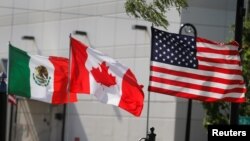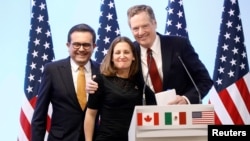Canada and the United States on Saturday narrowed their differences in last-ditch talks to save NAFTA but there is no guarantee an agreement will be forged, two Ottawa sources said, a notion echoed by a top adviser to U.S. President Donald Trump.
The two nations are trying to find a way to update the North American Free Trade Agreement and prevent it from collapsing.
The 1994 pact underpins $1.2 trillion in annual trade and its demise would be enormously damaging, economists say.
Trump is threatening to impose auto tariffs on Canada unless it signs a text of an updated agreement by the end of Sunday. Washington has a deal with Mexico, the third member of NAFTA.
Address to UN delayed
In a sign of the mounting pressure, Canadian Foreign Minister Chrystia Freeland postponed her country’s annual address to the U.N. General Assembly on Saturday to return to Ottawa. Freeland, who has spent many days in Washington over the last month, has no plans to fly back immediately, officials say.
The two sides are talking continuously by phone, and a Canadian government source said the tone of the negotiations was positive and intense.
“The fact talks are still going on shows there are issues to be settled. A deal is not necessarily going to happen,” said the source, who requested anonymity given the sensitivity of the situation.
'Big issues solved'
Trump’s trade and manufacturing adviser Peter Navarro, speaking Saturday to Fox News, struck an upbeat tone on the progress of talks.
“Most of the big issues are solved with Canada,” Navarro said, adding it would be “a great deal for all three countries.”
Trump blames NAFTA for causing U.S. manufacturing jobs to move to low-wage Mexico and is demanding major changes.
“We’ll see what happens with Canada, if they come along. They have to be fair,” Trump said Saturday during a rally in Wheeling, West Virginia, complaining about Canada’s dairy tariffs, which have been a particularly sore point for him.
“We’ve made the deal with Mexico, and it’s a great deal for both countries,” Trump said.
The office of Canadian Prime Minister Justin Trudeau declined to comment Saturday’s talks. A spokesman for USTR did not respond to requests for comment on the talks.
Sticking point
A second Ottawa source said the two sides were still trying to resolve disagreements over a dispute resolution mechanism that Canada says is vital and the United States wants to scrap.
In exchange for a compromise on the mechanism, Ottawa is set to bow to a U.S. demand to offer significantly more access to Canada’s protected dairy market, said the source.
A third source familiar with the negotiations said the idea of a link between dispute resolution and dairy access was not currently being discussed.
Opening up the dairy market could cause problems for Trudeau, since the influential farming industry opposes the idea. The Dairy Farmers of Canada lobby group did not respond to a request for comment.
Sources familiar with the talks told Reuters Sept. 11 that Canada was ready to give the United States limited dairy access. Ottawa has offered farmers compensation to make up for conceding market share in two earlier trade agreements.
Automakers consulted
Automaker executives briefed on the plans said Saturday they expect a final deal similar to the one reached with Mexico that would effectively cap Canadian vehicle and auto parts exports at a level around 40 to 50 percent higher than existing imports.
The agreement would allow the United States to impose tariffs of up to 25 percent on vehicles above the cap. The USTR’s office reached out to automakers over the weekend to seek input about how the cap will work and how the vehicle quota will be apportioned, an auto industry executive briefed on the matter said.
One big uncertain question for U.S. and foreign automakers is whether U.S. tariffs on Canadian steel will be lifted.
A NAFTA deal had looked unlikely Wednesday when, after a month of slow-moving discussions, Trump indicated he was fed up with Trudeau, who has insisted he will not sign a bad deal.
But late Thursday, U.S. officials reached out to Canada to ask for details of Ottawa’s negotiating demands and where it might be able to make compromises, Reuters reported.
Trump is under increasing pressure from U.S. business groups and some members of the U.S. Congress, who say excluding Canada from NAFTA would play havoc with the three member nations’ increasingly integrated economies.








